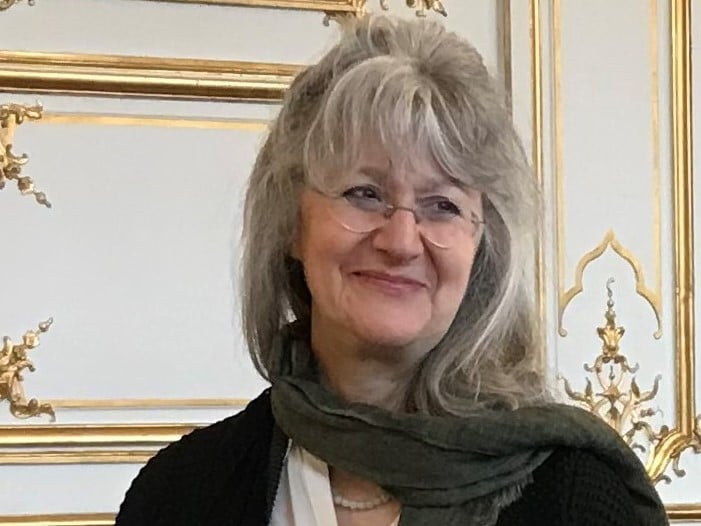Hi Theresa. Can you tell us a bit about your professional activity?
I’ve been a freelance translator for 23 years. A long time ago, in a galaxy far, far away, I was an opera singer.
What studies did you complete? Why did you choose to learn French?

I’m specialized primarily in music, and also literature. I didn’t “officially” speak French when I learned at 15 years old in England! I started truly learning it a lot later, firstly because I came to live in France, and secondly because it was the most practical language for communicating with my second husband (who is French). In fact, he was my real “school”, apart from France itself. I owe him a lot.
How did you come to the idea of being an independent translator?
A difficult time in my life… Divorce, I needed a way to earn a living – at that point in my life, singing was no longer an option – and I didn’t have any idea what to do. I always loved words and literature, I sang in many languages, I wrote verses and stories all my life, and I worked as a copywriter for a dictionary for many years – so how to use all of that? I was completely lost. Then, a friend asked me, “Why not translation?” I had taken Latin in high school and I always loved translation (to and from English), and his suggestion just clicked. So, I got a diploma from the American University of Paris, and it was the best investment of my life! I was extremely lucky: it worked from the start – thanks to the diploma, of course, but also thanks to the people I had encountered doing it.
What does the translation process look like for you?
I verify it’s within my wheelhouse, first – and if so, I go over it once. For me, as for a lot of translators (or probably all), I like to have enough time to set it aside for at least a day (or even a few hours). The number of problems in comprehension that resolve themselves once you take a automatically once the pressure is off. Also, if there are difficult technical terms, etc. – we have the time to ask the client questions. Then, on the second pass, I eliminate the superfluous text, refine the style – both for my personal satisfaction, and for the tone of the text – and of course I check the spelling and for any other errors. Then, I do a third revision. But, in fact, the process is endless, we can never reread it too many times, you have to know when to stop. There are as many different ways to do it – especially for creative texts (my favourite) – as there are translators…
Do the cultural differences between France and Britain make it more difficult to translate?
Yes, at times. One of the major problems for translators is the education system – diplomas, certifications, degrees, etc. – where often you’re forced to write an entire thesis to describe something that is obvious to a French person, but not for an Anglo-Saxon. Otherwise, it’s most flagrant when it comes to expressions and turns of phrases – sometimes there is an equivalent expression, but often not – but I actually adore this kind of challenge, and especially finding solutions for word play. Anytime I’m bested by a pun, I feel so depressed!
Have you noticed a change in the kinds of projects sent to you from your clients?
Not really, I have to say. Maybe because I’ve been doing this job for so long and everyone has their own ways!
What difficulties do you face in your job, but also, what do you appreciate the most?
Obviously, always working in solitude isn’t always easy, but, at the same time, it can be very pleasant. What I love is being able to spend my time how I like. If I don’t want to work at all during the day, but rather at night, I can (and it happens!). I can go on holiday when I want to (though it is never paid!). In this career, what I love, really, is that we always learn something new, and what really amuses me, is that, in one way or another, everything bears its own fruit. We never know when a little tidbit of random information will come in handy during a translation.
At times, I’m disappointed how client kind of abuse the fact that things are much quicker now, which leads them to requesting translations with extremely short deadlines. They’ll always receive better translations if translators have enough time to refine their texts.
Besides that, and I hope I’m not alone in this, the exponential evolution in technology it very – too – fast, I find. Thankfully, I work with TradOnline, who helps me with all that! But it’s also a problem for society in general.
Do you think that translation is a career path with a bright future?
Yes. Even if machine translations become more and more effective, the human element will always remain indispensable, I think, in order to give it meaning and style. We haven’t yet arrived in situation like that in George Orwell’s 1984, where one of the characters says, “It’s a beautiful thing, the destruction of words.” That runs a chill down my spine! That said, translators must adapt to the changing technology of our profession. Which could be a good thing, in fact!
What advice would you give to someone who is interested in a career in translation?
Like I said, everything bears fruit… So, you can come to translation from a lot of different backgrounds, I think.? But I really don’t feel qualified to be giving advice at this point in my life. The profession has changed enormously since I began; I think it’s harder for newcomers now, with all the competencies and technologies that have appeared over the last few years. When I started, faxing was already a miracle – and Internet, e-mail, Google, and all of that didn’t even exist yet!
Anything you want to add?
Yes – basically, I really love this job; I feel extremely privileged to be a part of it. What’s more, the people at TradOnline are really lovely. And that really means something…

